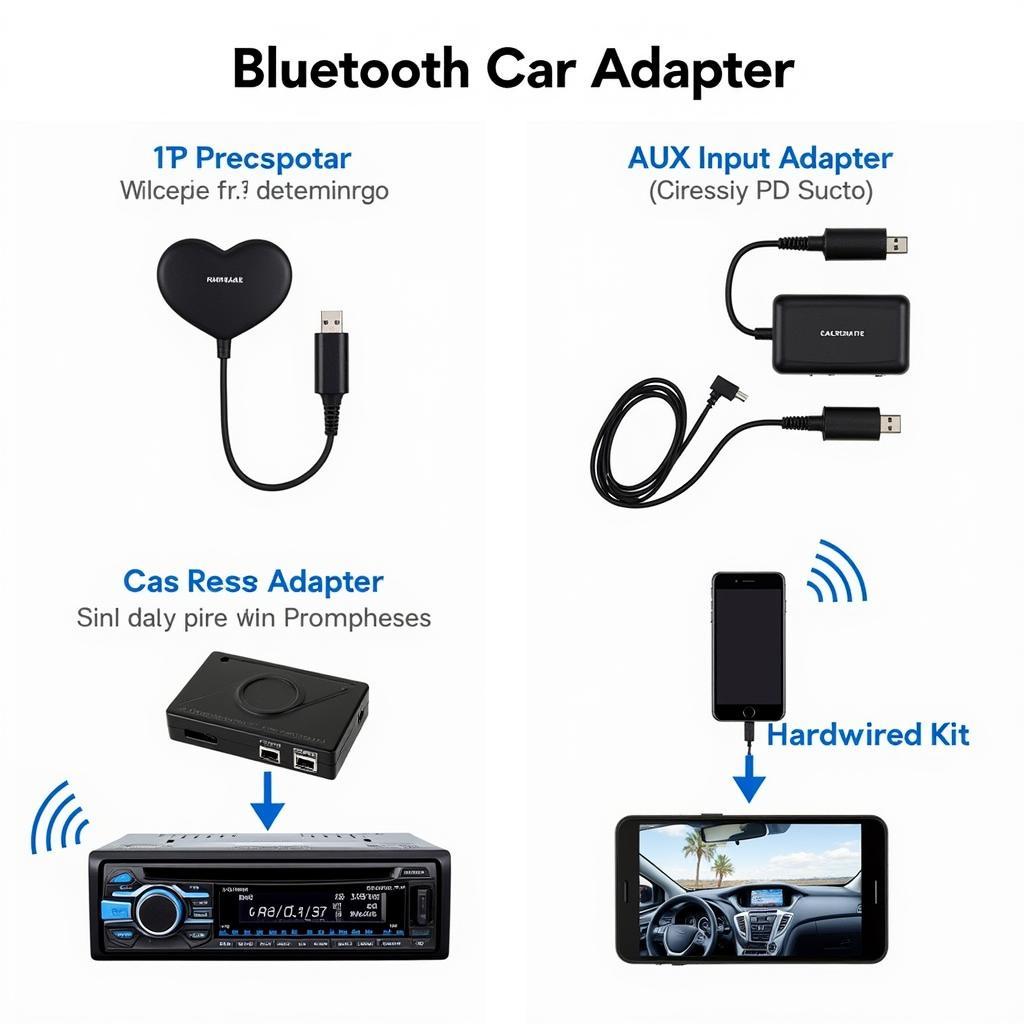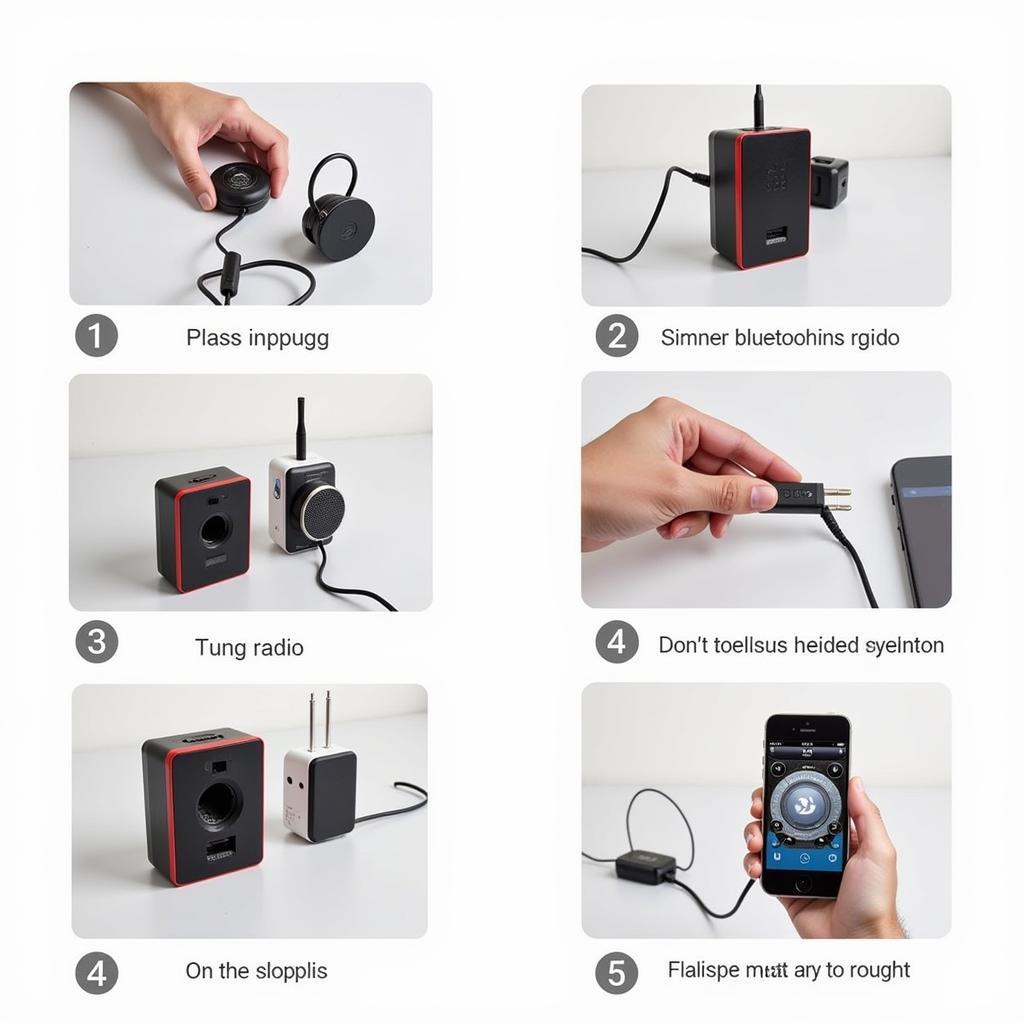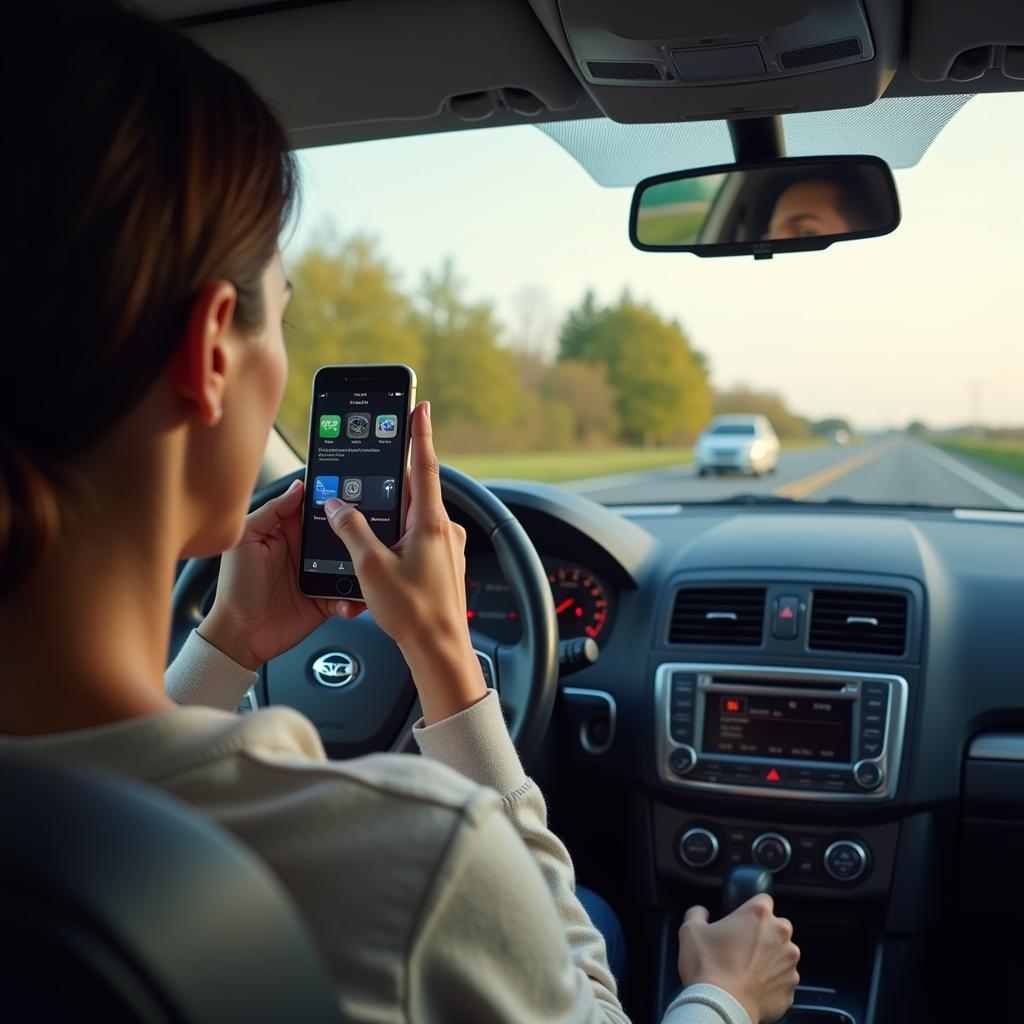Adding Bluetooth functionality to your car radio can drastically improve your driving experience. Whether you want to stream music, make hands-free calls, or access voice assistants, a Bluetooth add-on can bring your older car stereo into the modern age. This guide will delve into the various options available, from simple adapters to more integrated solutions, helping you choose the best Bluetooth add-on for your car radio and install it correctly. Having trouble with your car battery? Check our guide on failing car battery symptoms.
Choosing the Right Bluetooth Add-On for Your Car
The market is flooded with different Bluetooth car adapters, each with its own set of features and price points. Choosing the right one can be daunting, but by understanding your needs and the available options, you can make an informed decision.
Types of Bluetooth Car Adapters
- FM Transmitters: These are the most affordable and easiest to install. They transmit audio from your phone to your car radio via an unused FM frequency. However, sound quality can be inconsistent, and you may experience interference from other radio stations.
- Auxiliary Input Adapters: If your car radio has an auxiliary (AUX) input, these adapters plug directly into it, providing a more stable and higher-quality audio connection. They are also relatively inexpensive.
- Cassette Adapters: For cars with cassette players, these adapters mimic a cassette tape and connect to your phone via Bluetooth. While convenient for older cars, the sound quality is generally lower than other options.
- Hardwired Kits: These kits offer the best sound quality and integration but require professional installation. They connect directly to the car’s wiring, often providing additional features like charging ports and hands-free calling controls.
 Types of Bluetooth Car Adapters
Types of Bluetooth Car Adapters
Factors to Consider
- Sound Quality: How important is premium audio to you? If you’re an audiophile, a hardwired kit or AUX input adapter might be the best choice.
- Ease of Installation: Are you comfortable with DIY installation, or would you prefer a professional to handle it?
- Budget: Bluetooth add-ons range from very affordable to quite expensive. Set a budget before you start shopping.
- Features: Do you need hands-free calling, voice assistant integration, or just music streaming?
Installing Your Bluetooth Add-On
The installation process varies depending on the type of adapter you choose. Here are some general guidelines:
FM Transmitter Installation
- Plug the FM transmitter into your car’s 12V power outlet (cigarette lighter).
- Tune your car radio to an unused FM frequency.
- Set the FM transmitter to the same frequency.
- Pair your phone with the transmitter via Bluetooth.
AUX Input Adapter Installation
- Plug the adapter into your car’s AUX input.
- Plug the other end of the adapter into your phone’s headphone jack (or use a suitable adapter).
- Select the AUX input on your car radio.
Cassette Adapter Installation
- Insert the cassette adapter into your car’s cassette player.
- Pair your phone with the adapter via Bluetooth.
 Installing a Bluetooth Adapter in a Car
Installing a Bluetooth Adapter in a Car
For hardwired kits, professional installation is highly recommended.
Troubleshooting Common Issues
Sometimes, you may encounter problems with your Bluetooth add-on. Here are some common issues and their solutions:
- Poor Sound Quality: Try a different FM frequency if using an FM transmitter. Check the connection if using an AUX or cassette adapter. Consider upgrading to a higher-quality adapter.
- Connection Issues: Ensure your phone’s Bluetooth is enabled and that the adapter is in pairing mode. Try restarting your phone and the adapter. If problems persist, refer to the adapter’s manual.
- Interference: If using an FM transmitter, experiment with different frequencies to find one with less interference.
If you’re experiencing issues with your car battery, refer to our guide on car battery failing symptoms.
“A common mistake people make is choosing the cheapest option without considering their needs,” says John Davis, a seasoned automotive electrical engineer. “Investing in a quality Bluetooth add-on can greatly enhance your driving experience.”
Bluetooth Add On to Car Radio: Enhance Your Driving Experience
Adding a Bluetooth add-on to your car radio can significantly improve your driving experience. By carefully considering your needs and choosing the right adapter, you can enjoy hands-free calling, music streaming, and voice assistant access in your car. Remember to troubleshoot any issues you may encounter and always prioritize safety while driving. A properly installed and functioning Bluetooth add-on to car radio can make every drive more enjoyable and connected. What are you waiting for? Upgrade your car stereo today!
Is a dead battery the same as a bad alternator? Learn more about dead battery vs dead alternator.
FAQ
- Can I install a Bluetooth add-on myself? Yes, most adapters are easy to install. However, hardwired kits require professional installation.
- What is the best type of Bluetooth add-on for my car? It depends on your car’s features, your budget, and your desired sound quality.
- How do I fix interference with my FM transmitter? Try different frequencies until you find one with less interference.
- Why is my Bluetooth adapter not connecting? Ensure your phone’s Bluetooth is enabled and the adapter is in pairing mode. Try restarting both devices.
- Can I use a Bluetooth add-on for navigation? Yes, many adapters allow you to hear navigation prompts through your car speakers.
- What if my car only has a cassette player? A cassette adapter can be a viable solution.
- Does a bad cell in the car battery affect the Bluetooth add-on? A failing battery can affect the performance of all electrical components, including a Bluetooth add-on. Learn more about one bad cell in car battery.
“A well-chosen Bluetooth adapter can breathe new life into an older car stereo,” adds Sarah Miller, another automotive expert. “It’s a simple and cost-effective way to modernize your driving experience.” If you think you have a failing battery, check out failing battery symptoms.

